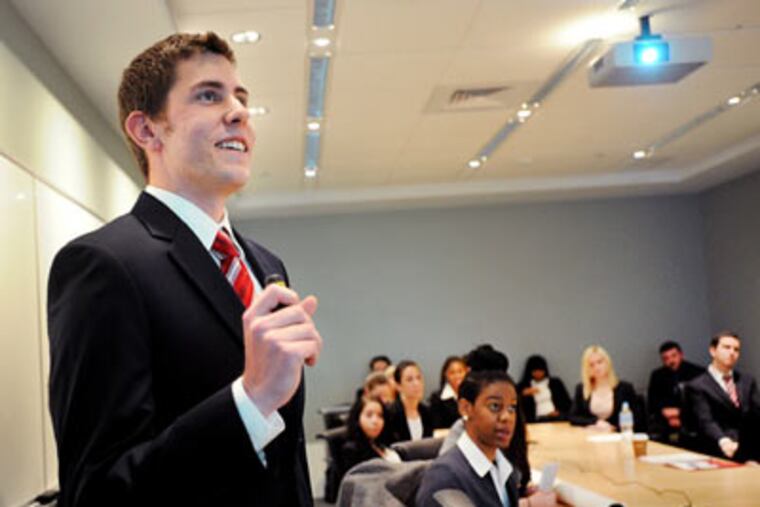Temple class offers HR students a view of real-world retail
Maybe some college business-school graduates end up in an office (or at least a cubicle), working weekdays, quitting at 5 p.m. But it’s nothing like that in retail, where a grad on the management track can have big responsibilities quickly. “This is some people’s first job,” said Nicole Monzo, 26, human-resources manager for the Target store in Oaks, Montgomery County, where she handles hiring, scheduling, and disciplining for the store’s 100-plus associates. “It’s not a sit-at-a-desk job. You are working weekends. You can be overwhelmed with the work, or not know what to do, or need to vent.”

Maybe some college business-school graduates end up in an office (or at least a cubicle), working weekdays, quitting at 5 p.m. But it's nothing like that in retail, where a grad on the management track can have big responsibilities quickly.
"This is some people's first job," said Nicole Monzo, 26, human-resources manager for the Target store in Oaks, Montgomery County, where she handles hiring, scheduling, and disciplining for the store's 100-plus associates. "It's not a sit-at-a-desk job. You are working weekends. You can be overwhelmed with the work, or not know what to do, or need to vent."
Monzo understands this very well, which is why she recently found herself at Temple University's Fox School of Business, administering what amounts to the final exam for a class called "HR on the Ground."
For the last three years, students in the class, taught by faculty member Katherine Nelson, have served as human-resources consultants to a group of regional Target stores.
"I think this class gives kids a real bird's-eye view of what the real work world is like" for professionals, Nelson said. That's a key point at a time when many college graduates are struggling to find work while employers complain that many graduates lack soft skills, such as a professional attitude and the ability to communicate on the job.
A previous assignment for the class was to help develop a social-networking policy. This semester, Target asked the group to create a mentoring program for college graduates recruited to be assistant store managers or, in Target talk, executive team leaders. Monzo and her colleague Amanda Abney, senior campus field recruiter, spent two hours on Temple's campus in late April listening to presentations from about 20 students, most of them juniors and seniors.
"I'm going to take this to our leadership team," Abney said as she scribbled comments on a grading spreadsheet designed by Nelson. "I'm really impressed with our discussion."
The students produced a mentoring website, two videos demonstrating good and bad initial meetings, two brochures describing techniques for effective mentoring, a PowerPoint presentation summarizing existing research, an evaluation survey, and two incentive systems designed to keep mentors and mentees meeting.
It may seem that mentoring should involve simple conversation, but there are many complicated issues: How often should the pair meet, and when and where? What's the best approach to providing positive and negative feedback? How long should the program last? Should mentors be assigned?
"I had a mentor," Abney said. "It was an arranged marriage, and it didn't work." Later, she found her own, and the relationship continued for years. Nelson's students recommended something in the middle: Using a Match. com-like website, novice employees could choose among several mentors matched to them based on questionnaires.
Even so, "it's a computer. It can make mistakes," said senior Stephen McGorry. He and the others suggested giving both sides a graceful way out of a bad match.
The mentor should set an optimistic tone, advised Amantha Simpson, a junior, so that the mentee "can turn weaknesses into strengths. It's important that they not solve problems for the mentee. The mentee relationship can go bad if the mentee gets too dependent on the mentor."
Target routinely recruits at Temple for executive team leaders, and has hired some students after seeing their "HR on the Ground" presentations. Abney and Monzo said later that a couple of students who had been just so-so in an earlier round of interviews would get a second look because of their demeanor and poise and the quality of their suggestions.
At Target, most of the college-recruited executive team leaders start by running several departments in a store. There is a separate track for human-resources team leaders. In both cases, they rotate through two or three assignments, each 18 to 24 months long, before being in line for promotion to store manager and a salary that commands six figures.
Nelson said most of her students have had jobs, usually in food service or retail. One senior who presented last month had been a lower-level supervisor at a Target in his hometown.
The class "teaches them consulting, which is important in human resources," she said.
"Really good HR people are consultants to their businesses, wherever they happen to be. They are coaching, they are problem-solving, they are strategizing. They have to find solutions."
Contact Jane M. Von Bergen at 215-854-2769 or jvonbergen@phillynews.com, or follow on Twitter @JaneVonBergen. Read her blog, "Jobbing," at www.philly.com/jobbing.